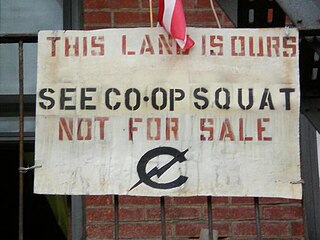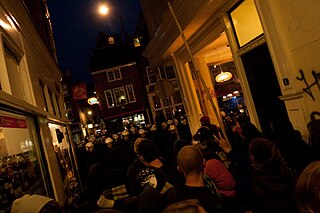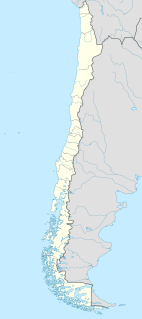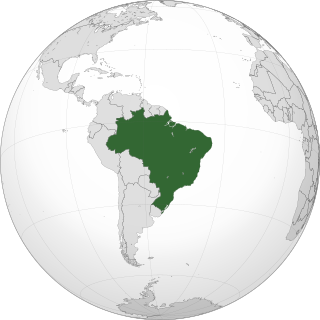
Squatting is the action of occupying an abandoned or unoccupied area of land or a building, usually residential, that the squatter does not own, rent or otherwise have lawful permission to use. The United Nations estimated in 2003 that there were one billion slum residents and squatters globally. Squatting occurs worldwide and tends to occur when people who are poor and homeless find empty buildings or land to occupy for housing. It has a long history, broken down by country below.

A shanty town or squatter area is a settlement of improvised buildings known as shanties or shacks, typically made of materials such as mud and wood. A typical shanty town is squatted and in the beginning lacks adequate infrastructure, including proper sanitation, safe water supply, electricity and street drainage. Over time, shanty towns can develop their infrastructure and even change into middle class neighbourhoods. They can be small informal settlements or they can house millions of people.

Self-managed social centres in the United Kingdom can be found in squatted, rented, mortgaged and fully owned buildings. These self-managed social centres differ from community centres in that they are self-organised under anti-authoritarian principles and volunteer-run, without any assistance from the state. The largest number have occurred in London from the 1980s onwards, although projects exist in most cities across the UK, linked in a network. Squatted social centres tend to be quickly evicted and therefore some projects deliberately choose a short-term existence, such as A-Spire in Leeds or the Okasional Café in Manchester. Longer term social centres include the 1 in 12 Club in Bradford, the Cowley Club in Brighton and the Sumac Centre in Nottingham, which are co-operatively owned.

C-Squat is a former squat house located at 155 Avenue C in the Alphabet City neighborhood of Manhattan, New York City that has been home to musicians, artists and activists, among others. After a fire, it was taken into city ownership in 1978 and squatters moved in in 1989. The building was restored in 2002 and since then it has been legally owned by the occupants. Its ground-floor storefront now houses the Museum of Reclaimed Urban Space.

Patio Maravillas was a multi-purpose self-managed social centre which occupied several spaces in central Madrid between 2007 and 2015.
The Frances Street Squats were a set of six squatted houses, including one women-only building, that existed between February and November 1990 in Vancouver, Canada. They were occupied by SAVE and took a stand against development which was generally supported by local people. The Vancouver Police Department evicted the buildings.

The Dutch squatting ban refers to the law introduced on 1 October 2010, under which squatting in the Netherlands became de jure illegal. Criminalization had first been proposed in the 1970s, but was opposed by the Council of Churches. In 2006, a new plan was proposed and backed by parties including VVD and PVV. When the new law was introduced, squatters occupied the former head office of the fire brigade and there were riots in Amsterdam and Nijmegen. In 2011, the Supreme Court of the Netherlands ruled that the legally forced end of squatting can only occur after an intervention of a judge. Between October 2010 and December 2014, 529 people were arrested for the act of occupying derelict buildings, in 213 separate incidents as a result of which 39 people were jailed.

Squatting in England and Wales usually refers to a person who is not the owner, taking possession of land or an empty house. People squat for a variety of reasons which include needing a home, protest, poverty, and recreation. Many squats are residential, some are also opened as social centres. Land may be occupied by New Age travellers or treesitters.
Squatting in the United States is the unauthorized use of real estate. Historically, squatting occurred during the California Gold Rush and when colonial European settlers established land rights. There was squatting during the Great Depression in Hoovervilles and also during World War II. Shanty towns returned to the US after the Great Recession of 2007 to 2009 and in the 2010s, there have been increasing numbers of people squatting foreclosed homes using fraudulent documents. In some cases, a squatter may be able to obtain ownership of property through adverse possession.

Squat Milada is a First Republic villa located in the Libeň district of Prague. Milada was intended to be demolished in the 1980s and thus deleted from the cadastre, becoming a house which officially did not exist. It became one of the Czech Republic's best known squats, occupied from 1997 until 2009. It was then reoccupied for a day in 2012. Acting as a self-managed social centre and infoshop hosting concerts and events, Milada was also home to a number of people. Despite various plans for the site, as of 2019, the building was standing derelict.

Squatting in Australia usually refers to a person who is not the owner, taking possession of land or an empty house. In 19th century Australian history, a squatter was a settler who occupied a large tract of Aboriginal land in order to graze livestock. At first this was done illegally, later under licence from the Crown.

Squatting in the Republic of Ireland is the occupation of unused land or derelict buildings without the permission of the owner. In the 1960s, the Dublin Housing Action Committee highlighted the housing crisis by squatting buildings. From the 1990s onwards there have been occasional political squats such as Grangegorman.

We Are Here is a collective of migrants based in Amsterdam, the Netherlands, which campaigns for human rights for its members and all undocumented migrants. The asylum seekers have in many cases had their applications to remain in the Netherlands denied but they either cannot go back or refuse to return to their country of origin. They ask for access to social services such as medical care and housing. The group formed in 2012 and by 2015 contained over 200 migrants from around 15 countries.

Squatting in the Netherlands is the occupation of unused or derelict buildings or land without the permission of the owner. The modern squatters movement began in the 1960s in the Netherlands. By the 1980s, it had become a powerful anarchist social movement which regularly came into conflict with the state, particularly in Amsterdam with the Vondelstraat and coronation riots.

Squatting in Spain refers to the occupation of unused or derelict buildings or land without the permission of the owner. In Francoist Spain migrant workers lived in slums on the periphery of cities. During the Spanish transition to democracy, residential squatting occurred in Spanish cities such as Barcelona, Bilbao, Madrid, Valencia and Zaragoza. From the 1980s onwards a new generation of squatters set up self-managed social centres which hosted events and campaigns. The 1995 Criminal Code among other things criminalised squatting, but failed to stop it. Social centres exist across the country and in Barcelona and Madrid in particular. In the Basque Country they are known as gaztetxes.

Squatting in Honduras is the occupation of unused land or derelict buildings without the permission of the owner. As the population of Honduras grew from the 1960s onwards, peasants occupied land. The Government of Honduras responded by giving peasants title to land and deporting Salvadoran migrants. The measures had limited success and in the 2010s, squatters continued to self-organise land invasions. The indigenous Miskito people are affected by squatters who practice illegal logging and drugs trafficking.

Squatting in Chile is the occupation of unused land or derelict buildings without the permission of the owner. From the 1960s onwards, informal settlements known as callampas were permitted although there were also evictions such as the massacre of Puerto Montt in 1969. In the 1970s, the government of Salvador Allende encouraged occupations, then following the coup d'état, the military junta repressed squatting. Callampas then became known as campamentos.

Squatting in Brazil is the occupation of unused or derelict buildings or land without the permission of the owner. After attempting to eradicate slums in the 1960s and 1970s, local governments transitioned to a policy of toleration. Cities such as Recife, Rio de Janeiro and São Paulo have large informal settlements known as favelas. A more recent phenomenon is the occupation of buildings in city centres by organised groups. In rural areas across the country, the Landless Workers' Movement (MST) arranges large land occupations.

Squatting in Angola occurs when displaced peoples occupy informal settlements in coastal cities such as the capital Luanda. The Government of Angola has been criticized by human rights groups for forcibly evicting squatters and not resettling them.

Squatting in Liberia is one of three ways to access land, the other being ownership by deed or customary ownership. West Point was founded in Monrovia in the 1950s and is estimated to house between 29,500 and 75,000 people. During the First Liberian Civil War 1989–1997 and the Second Liberian Civil War 1999–2003, many people in Liberia were displaced and some ended up squatting in Monrovia. The Ducor Hotel fell into disrepair and was squatted, before being evicted in 2007. Recently, over 9,000 Burkinabés were squatting on remote land and the Liberia Land Authority (LLA) has announced it will be titling all land in the country.


















